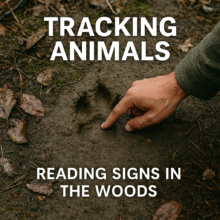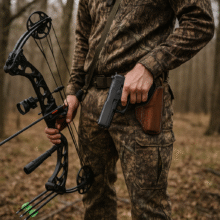Hunting Tips for Beginners: Essential Advice to Get Started

Table of Contents
- Table of Contents
- 1. Introduction: Embarking on Your Hunting Journey
- 2. Understanding Hunting Laws and Regulations
- 3. Safety First: Prioritizing Hunter Safety
- 4. Choosing the Right Hunting Gear and Equipment
- 5. Scouting and Locating Game
- 6. Planning and Preparation for a Hunt
- 7. Fieldcraft: Mastering Stealth and Concealment
- 8. Shot Placement and Ethical Hunting
- 9. Tracking and Recovering Game
- 10. Field Dressing and Processing Game
- 11. Frequently Asked Questions (FAQs)
- 12. Conclusion: Embrace the Adventure of Hunting
Table of Contents
1. Introduction: Embarking on Your Hunting Journey
Hunting is a time-honored tradition that connects us with nature and provides a unique opportunity to harvest game. As a beginner, it’s important to approach hunting with the right mindset, proper knowledge, and essential skills. In this guide, we will provide you with valuable tips and advice to help you get started on your hunting journey.
2. Understanding Hunting Laws and Regulations
Researching Local Hunting Laws
Before heading into the field, familiarize yourself with the hunting laws and regulations specific to your area. Research the requirements for obtaining hunting licenses, permits, and tags, as well as any restrictions or special considerations for the game species you intend to hunt.
Obtaining the Necessary Licenses and Permits
Ensure that you have the appropriate licenses and permits for hunting. Visit your local wildlife agency or department to obtain the necessary documentation and information. It’s essential to hunt legally and responsibly, following all applicable rules and regulations.
Familiarizing Yourself with Hunting Season Dates
Take note of the hunting season dates for the game species you plan to pursue. Each species has specific seasons and bag limits, which may vary by location. Adhering to these dates and limits helps ensure sustainable game populations and responsible hunting practices.
3. Safety First: Prioritizing Hunter Safety
Handling Firearms Safely
Learn and practice proper firearm safety techniques. Always treat every firearm as if it is loaded, keep your finger off the trigger until ready to shoot, and never point a firearm at anything you do not intend to shoot. Take a hunter education course to gain essential knowledge about firearm safety.
Wearing Appropriate Safety Gear
Wear appropriate safety gear, including a blaze orange hat or vest, to enhance your visibility to other hunters in the field. Additionally, protect your eyes and ears by wearing shooting glasses and hearing protection.
Communicating and Hunting in Groups
If hunting in a group, establish clear communication and follow safe hunting practices. Clearly identify your hunting partners and establish safe zones of fire. Regularly communicate your positions and movements to avoid accidents and ensure everyone’s safety.
4. Choosing the Right Hunting Gear and Equipment
Selecting a Suitable Firearm or Bow
Choose a firearm or bow that matches your skill level and the game you plan to hunt. Seek advice from experienced hunters or consult with a knowledgeable retailer to select the appropriate equipment. Practice shooting and become familiar with your chosen weapon before heading into the field.
Essential Gear for Every Hunting Trip
Prepare a hunting checklist that includes essential gear such as navigation tools, a first aid kit, survival equipment, water, and snacks. Bring appropriate clothing layers for varying weather conditions, a knife for field dressing, and game bags for meat preservation.
Clothing and Camouflage for Concealment
Wear clothing appropriate for the hunting environment and season. Consider camouflage patterns that blend with the surroundings to break up your silhouette. Opt for moisture-wicking and scent-control clothing to minimize human odor and maximize your concealment.
5. Scouting and Locating Game
Identifying Signs of Animal Presence
Learn to identify signs of animal presence such as tracks, scat, rubs, and feeding areas. These signs can provide valuable insights into the movements and habits of game animals. Pay attention to fresh signs and recent activity to increase your chances of locating game.
Using Trail Cameras and Scouting Techniques
Trail cameras can be useful tools for monitoring game activity and patterns. Strategically place trail cameras in areas where game is likely to frequent, such as watering holes or game trails. Review the camera footage to gain knowledge about the size, behavior, and timing of game movement.
Studying Animal Behavior and Habitat
Take the time to study the behavior and habitat preferences of the game species you are targeting. Learn about their feeding patterns, preferred bedding areas, and daily movements. This knowledge will help you identify suitable hunting locations and develop effective hunting strategies.
6. Planning and Preparation for a Hunt
Researching Hunting Areas and Access Points
Research the hunting areas you plan to visit. Look for public lands, wildlife management areas, or private properties where hunting is allowed. Identify access points, parking areas, and any specific regulations or restrictions that apply to those areas.
Creating a Hunting Checklist
Prepare a detailed hunting checklist to ensure you have all the necessary equipment and supplies for your hunting trip. Include items such as licenses and permits, ammunition or arrows, hunting calls, binoculars, range finders, and any personal essentials for the duration of your hunt.
Developing a Hunt Plan and Strategy
Develop a hunt plan that outlines your objectives, hunting locations, and preferred techniques. Consider factors such as wind direction, topography, and the behavior of game animals. Be flexible and adjust your plan based on real-time field conditions.
7. Fieldcraft: Mastering Stealth and Concealment
Moving Quietly and Silently in the Field
Practice moving quietly and silently through the hunting area. Avoid sudden movements and be mindful of your surroundings. Slow, deliberate movements will help you remain undetected by game animals.
Utilizing Natural Cover and Terrain
Utilize natural cover, such as trees, bushes, or terrain features, to break up your silhouette and remain hidden. Take advantage of natural hiding spots and use them to your advantage when stalking or setting up for a shot.
Controlling Human Scent
Take steps to control your human scent by using scent-control products and practicing scent-masking techniques. Avoid wearing strong scented products and store your hunting clothing in a scent-free environment.
8. Shot Placement and Ethical Hunting
Understanding the Anatomy of Game Animals
Learn the anatomy of the game animals you are targeting. Understand the vital organs and aim for areas that will result in a quick and humane kill. Practice shooting from various angles and distances to improve your shot placement skills.
Aiming for Clean and Humane Kills
Always aim for clean and humane kills, prioritizing ethical hunting practices. Take shots within your effective shooting range and wait for the right opportunity to ensure a quick and clean kill. Avoid taking risky shots that may result in wounding an animal.
Knowing Your Effective Shooting Range
Know your effective shooting range and practice shooting at different distances. This will help you determine your limitations and ensure accurate and ethical shots. Remember that your effective shooting range may vary depending on factors such as your proficiency, equipment, and environmental conditions.
9. Tracking and Recovering Game
Reading Blood Trails and Signs
Learn how to read blood trails and signs left by wounded game. Observe the color, consistency, and quantity of blood to assess the severity of the hit. Follow the trail carefully, marking your progress, and use tracking techniques to locate and recover the wounded animal.
Tracking Techniques for Wounded Game
Utilize tracking techniques such as grid searching, marking blood spots, and observing the direction of travel. Stay focused and patient, following the trail step by step. Pay attention to any changes in blood sign and other animal behavior that may indicate the presence of the wounded game.
Utilizing Tracking Dogs if Available
If available, consider utilizing the services of a trained tracking dog to aid in recovering wounded game. Tracking dogs have a remarkable ability to follow scent trails and can greatly increase the chances of successful recovery.
10. Field Dressing and Processing Game
Proper Field Dressing Techniques
Learn proper field dressing techniques to ensure the preservation of meat and minimize spoilage. This includes gutting the animal, removing the internal organs, and cooling the carcass promptly. Follow sanitary practices and handle the meat with care to maintain its quality.
Preserving the Meat and Handling Game
Once the animal is field-dressed, take appropriate measures to preserve the meat. Cool it down as quickly as possible and consider using game bags to protect it from dirt and insects. If the weather permits, hang the carcass in a cool, well-ventilated area to age the meat.
Understanding Local Regulations for Transporting Game
Familiarize yourself with local regulations regarding the transportation of game. This includes tagging requirements, proper documentation, and any specific rules regarding the transportation of certain species. Ensure compliance with these regulations to avoid legal complications.
11. Frequently Asked Questions (FAQs)
1. Do I need to take a hunter education course before hunting? Hunter education courses are mandatory in many jurisdictions, especially for new hunters. These courses cover firearm safety, hunting ethics, regulations, and other important topics. Check with your local wildlife agency to determine the requirements in your area.
2. How do I find a hunting mentor or guide? Finding a hunting mentor or guide can be beneficial, especially for beginners. Reach out to local hunting organizations, sportsmen’s clubs, or online forums to connect with experienced hunters who may be willing to share their knowledge or offer guidance.
3. What are the best hunting seasons for beginners? Some popular hunting seasons for beginners include small game seasons such as squirrel or rabbit hunting. These seasons provide opportunities to learn fieldcraft, practice shooting skills, and gain valuable hunting experience.
4. Can I hunt on public lands? Public lands offer hunting opportunities in many areas, but specific regulations and restrictions may apply. Research the rules and obtain the necessary permits or licenses for hunting on public lands. Contact the managing agency to learn about any additional requirements or restrictions.
12. Conclusion: Embrace the Adventure of Hunting
As a beginner, hunting can be an exciting and rewarding outdoor pursuit. By understanding and following hunting laws, prioritizing safety, acquiring the right gear, honing your skills, and practicing ethical hunting, you can embark on a successful and enjoyable hunting journey. Remember to embrace the adventure, respect nature, and always strive to become a responsible and conservation-minded hunter. Happy hunting!







